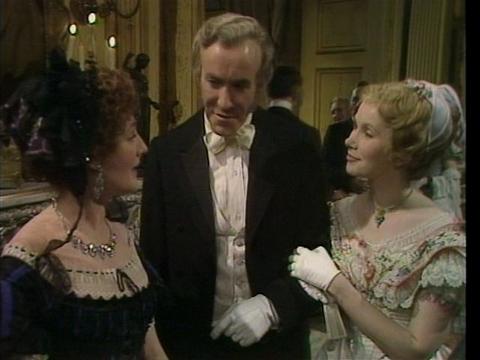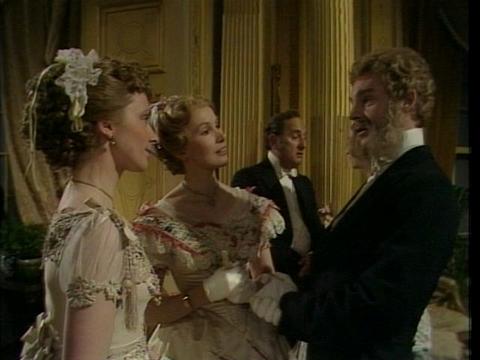Ellen and Jim Have a Blog, Too
We are two part-time academics. Ellen teaches in the English department and Jim in the IT program at George Mason University.


Pallisers 5:10: The Introduction of Lord Fawn · 15 April 08
Dear Harriet,
As in 3:6, Phineas Finn is first mentioned well (Episode 26) before he (or Donal MCCann) appeared (Episode 29); so Lord Fawn (Derek Jacobi) is brought in at mid-point in 5:10; that is, well before the matter of Eustace Diamonds gets started, or the end of 6:11, when Lizzie Eustace [Sarah Badel] appears on the film’s stage.
Since the third novel of Trollope’s is altered (and shortened) far more than the other five, it’s instructive to compare the introduction of Lord Fawn in Trollope’s Phineas Finn and Raven’s Pallisers 5:10. Fawn does appear in Phineas Finn; three times: as one of Lady Baldock’s chosen suitors for Violet Effingham as a husband, and as an minor individual at a political party. But you could not be blamed if you didn’t notice Fawn much in Trollope’s novel. There is no big trumpet blast, and no special attention is paid to him. He is just another suitor we are to reject and whose admission and encouragement by Lady Baldock is meant to make us dislike the values and norms he represents as well as Lady Baldock’s power over her niece. In Trollope’s Chapter 40, Finn and Fawn clash. Violet has said she finds Madame Max Goesler beautiful and Phineas agrees; Fawn is appalled. Trollope does not say why. Fawn is briefly and simpply presented as totally a dullard, someone with no thought of his own who would automatically reject anyone the least unconventional. He has a tone which shows he is put off by Finn—as his rival. He fawns all over Lady Baldock, and we are led to feel he wants Violet for her money and nothing else. There is nothing in common between them. Lady Baldock wants him because he is such a dull narrow man.
In Chapter 53, Fawn appears again, this time with Mrs Bonteen. Again there is an implicit clash between Finn and Fawn. They are at a political gathering, and without considering it, Finn objects to Fawn calling Chiltern a “madman.” This is after the duel, and also after Violet has accepted Chiltern. Finn simply says Violet has accepted Chiltern. This irritates Fawn as cutting him off: he cares more about his vanity than anything else. That Mrs Bonteen is there and apparently on Fawn’s side also prepares for how later Finn will find a venomous rival in Mr Bonteen. This small scene makes me think Trollope may have had something in his mind of Phineas Redux as he wrote.
By contrast in the film (as I have shown in my summary of 5:10) Fawn (Derek Jacobi) is pointedly introduced by bringing in Dolly Longestaffe (Donald Pickering, our choral figure) to respond to questions about him by Madame Max (Barbara Murray) who, an outsider still, does not know much about him); the description is witty, and sardonic; we then switch to Fawn talking to Monk (Bryan Pringle) and Lady Laura (Anna Massey) in a dialogue which exhibits Fawn’s hypocrisy about progressiveness, bigotry, and tactless transparency. He makes the mistake of asking Lady Laura why Lady Glen (Susan Hampshire) associates with such a woman or Phineas Finn, forgetting that Finn is Lady Laura’s protegee, and must laugh it off, when Lady Laura takes him up on it, oh that’s all right then as it’s you. The two of them indulge in egregious nastiness aimed at Madame Max (“foreign,” suspiciously without a family or clear niche), and this is immediately juxtaposed with her dialogue with Palliser and Lady Glen about her high ideals for reform.

Madame Max (Barbara Murray) recites a group of radical notions to to Palliser (Philip Latham) and Lady Glen, including manhood suffrage, womanhood suffrage, the right to strike, education for all …
We are in Episode 7, “Finn’s Pursuits,” an ironic title; so seeing Fawn against the background of Phineas’s double-life and dilemma, with Madame Max as the “other” as well as outsider. We then have dialogues where Fawn’s hostility to Finn is brought out much more strongly; he insinuates Finn never does any real work, and Palliser (Philip Lathan) defends him: this anticipates what is to happen when Phineas returns to London. Remember it was not only Mr Bonteen Phineas was accused of murdering, but Fawn who was chief witness against him.
In Raven’s Eustace Diamonds Fawn is a central figure who introduces Lizzie Eustace to high society, so we can in 5:10 see this signalled by this presentation of Fawn early on. It is to Jacobi’s credit he does not ham the part up, for he is sent up, a target of Raven’s satire on effeminate non-macho men. Here he is, regaling Lady Glen and Violet with his sisters (material taken from Eustace Diamonds):

Fawn (Derek Jacobi) regales Lady Glen (Susan Hampshire) and Violet Effingham (Mel Martin) with the histories of his sisters (‘07 BBC Pallisers)
Lady Glen. “Oh and how are your several sisters.
Finn comes over.
Fawn. “Oh, how kind of you to ask. Well … uh …
Finn to Violet: “I think I’ll go on sight and be Saint George for a while” (he retreats to flatter Lady Baldock)
Fawn. “Yes … well Clara, you know has married Mr. Hittaway. No doubt we shall be very soon having another little Hittaway on the way.
Lady Glen. “And Augusta?”
Fawn. “Augusta, well …”
He disappears after Episode 7, this is only our foretaste of what’s to come.
In previous viewings, I’ve disliked Raven’s transformation of Trollope’s Eustace Diamonds into the story of Lord Fawn (a fool), Frank Greystock (a fool seduced through sex) and Lizzie Eustace (equally a fool but of a different kind, aggressive in remarkably stupid ways) and her three hanger-on friends very much (Pallisers 7:12-7:14). Raven drops two of the three stories and the two I like best: Lucy Morris and Lady Fawn are nowhere to be seen, though we hear of the governess in the Fawn home. Raven drops Lucinda Roanoke completely too. He has no interest in women as such (outside their relationship to men and as he as an outsider and anti-conventional person identifies with them); he has no feeling for feminism (his analysis in his introduction to his edition of An Eye for an Eye shows he regards women as living to trap men, really.) Frank Greystock (Martin Jarvis) appears but somehow unable to resist Lizzie’s need and want of him, and sex with her, a kind of counter as kind-good hero to Lord George de Bruce Caruthers (Terence Alexander) who is our pragmatic gallant rogue who, while justifiably wary of any entanglement with Lizzie, is nonetheless treated with a mild contempt as he is also in need of Jane Carbuncle (Helen Lindsey).
I dislike sneers, and comedy aimed at effeminate men as anti-gay, but now as I watched Jacobi and Massey as Lord Fawn and Lady Laura dissing Murray as Madame Max I decided that Raven had decided to put a thoroughly dislikeable character at the center of the third major novel of his series. Raven is no sentimentalist and probably expected us to enjoy laughing at this man—a kind of approach I don’t enjoy because I don’t find narrow vicious bigots funny; that the world is filled with them and that they are often in high places is to me no laughing matter.
However, now I shall try to look to see what values are sent up by Raven. If none, if we are simply asked to laugh for example (as I recall) at the aging Duke’s lecherous chasing after a maid, this is unexamined sleaze.
Perhaps this is what some mean by cynicism (acceptance of viciousness?); I reserve the word for intelligent scepticism and seeing the real selfish and hard motives of people and exposing it out of disillusion. Now that is what Raven does in his brilliant Fielding Gray, an exposure of how a corrupt society turns homosexual sex into something sick because of how heterosexual opportunistic amoral individuals exploit the bigotry of others to destroy competition from homosexual men. The hero of Fielding Gray (the book alludes to Fielding’s Tom Jones and Oscar Wilde’s Portrait of Dorian Gray) is someone born with a decent kind heart who wanted to spend his life as a scholar at university, & (very like a woman coerced into a loveless marriage), is coerced into a military life by his parents to further their ambitions and desire for aggrandizement and conformity for safety and out of envy.
I don’t look forward to studying the Pallisers 7:13-7:14, but I’ve learnt in any project one does, if one wants to do it thoroughly, eventually you must immerse yourself in inferior work, though I’m hoping I will find something to recuperate from the distasteful trashy & cruel (if you consider the targets seriously) scenes I recall. I’m now thinking perhaps I have not done justice to a modern perspective on the Lizzie Eustace story similar to that I’ve discovered for the Phineas matter.
Sylvia
--
Posted by: Ellen
* * *
